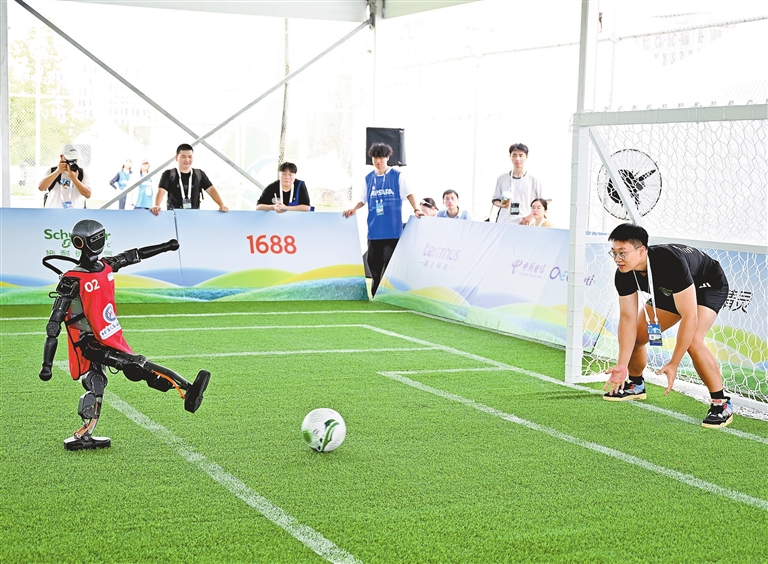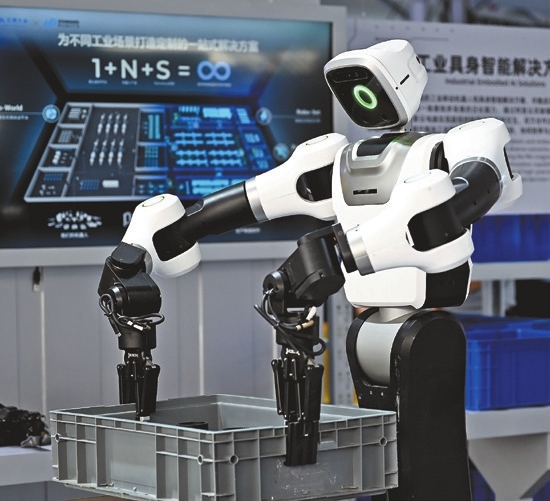

THE three‑day Apsara Conference 2025, with a focus on advanced technologies such as artificial general intelligence (AGI) and embodied intelligence, kicked off Wednesday in Hangzhou, Zhejiang Province. This year’s event convened more than 2,000 speakers from about 50 countries to examine the latest developments in AI and cloud computing. The expo showcased over 200 intelligent agent applications and some 300 AI terminal products, including next‑generation hardware such as AI glasses, AI personal computers and humanoid robots. At the opening ceremony, Alibaba unveiled a major upgrade to Alibaba Cloud’s full‑stack AI system, enhancing capabilities across the spectrum from large language models to AI infrastructure. The move is intended to position the company as a comprehensive, full‑stack AI service provider. In his opening remarks, Alibaba Group CEO Eddie Wu reiterated the company’s previous commitment to invest more than 380 billion yuan (about US$53 billion) in AI models and infrastructure through 2027, and said Alibaba intends to increase that commitment, though he did not disclose a new target figure. Wu also warned that by 2032 the company’s global data center energy consumption could be as much as 10 times higher than in 2022, underscoring the scale of resources required to support large‑scale AI deployment. The conference featured the debut of Alibaba Cloud’s high‑density AI server, capable of supporting 144 computing nodes, the rollout of the next‑generation high‑performance network architecture HPN 8.0, and upgraded versions of the Tongyi Qwen large‑language models. The exhibition area was organized into three themed pavilions: the AI+ Pavilion, the Computing Pavilion, and the Frontier Applications Pavilion. The AI+ Pavilion highlighted large language models and intelligent agent tools; the Computing Pavilion emphasized full‑stack capabilities from chips through platforms; and the Frontier Applications Pavilion brought together more than 100 Chinese and international tech startups, according to organizers. A wide range of companies demonstrated agent applications across practical scenarios. Exhibitors such as Siemens, SF Technology, China Eastern Airlines and MiniMax showcased solutions for power inspection and industrial sorting. Domestic automakers FAW, BYD, Li Auto and Xpeng presented smart cockpit technologies and autonomous‑driving achievements. The Frontier Applications Pavilion also put smart factory solutions in the spotlight. At Shenzhen‑based Leju Robotics’ booth, warehouse robots performed quality‑control tasks, moved boxes and collaborated on sorting operations; on automotive assembly lines, robots stowed empty cartons, assisted with sorting and inspected component quality. A company representative said Leju’s Kuavo humanoid robots have been deployed in FAW’s Hongqi factory to carry out intelligent tasks across multiple production scenarios. MiniMax, the Shanghai‑based AI unicorn, showcased proprietary multimodal foundation models and a suite of native AI products — including MiniMax Agent and the Hailuo AI video generator — offering visitors immersive intelligent services and audio‑visual demonstrations. The company turned its booth into a living lab to run live demonstrations powered by foundation models such as MiniMax M1, Hailuo 02, Speech 2.5 and Music 1.5, which the firm says can handle ultra‑long contexts and fuse text, audio and visual modalities in real time. The conference also emphasized international collaboration. Alibaba Cloud announced a partnership with Nvidia to integrate its PAI platform with Nvidia’s Physical AI stack, a collaboration Alibaba says will advance data synthesis, robot training and simulation for real‑world AI applications. The alliance is intended to accelerate development in embodied intelligence and assistive driving technologies. Observers at the event underlined the forum’s role in fostering China’s AI ecosystem. “The conference puts China’s AI applications, open‑ecosystem collaboration and global outlook on full display,” said Liu Gang, chief economist at the National Research Institute for New Generation Artificial Intelligence Development Strategies. In addition to domestic players, international companies including Cisco, Accenture and Nvidia participated in the conference. (SD-Agencies) | 
